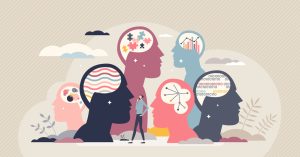Before the dawn of Clinical Psychology, mental maladies and disorders were considered to be demonic in origin. A person who seemed to act crazy or disorderly was quickly diagnosed as possessed or an evil spirit. Frightful enough, Stone Age skull remains show drilled holes into the skull that lead researchers to believe the holes were created to release evil spirits (Myers and Dewall, 2019, p.495). The terrifying treatment of those with abnormal behavior continued through the centuries and included an array of rituals to expose evil spirits or drive them away. As time progressed, individuals were sent to asylums and treated inhumanely being chained to beds or confined to small areas as if animals (Myers and Dewall, 2019, p.495).
The scientific era and medical model replaced these archaic beliefs to understand that mental issues and psychological disorders can be diagnosed and treated and in most cases cured (Myers and Dewall, 2019, p.495). This lead to a stronger understanding that psychological disorders are disturbances in cognition, emotional control and behavior. These behaviors hence are in some way dysfunctional and maladaptive (Myers and Dewall, 2019, p.494).

Hence psychological disorders prevent an individual from living a day to day normal life. In some way, they interfere at various extremes and levels with an individuals ability to perform and interact with others. While mental illness should never be a stigma, these types of disorders still carry heavy prejudices with them regarding employment and how others view individuals. Unlike a physical disability, mental disorders are viewed in a more harsh fashion, even if only today in whispers and at subconscious levels. Mental illness is still sometimes equated with crazy or dangerous.
The American Psychiatric Association Manual of Mental Disorders, Fifth Edition, is a hand book for mental health care professionals. It lists the broad range of mental maladies from the smallest to most extreme types of illnesses. It helps professionals diagnose and treat a variety of maladies listing the numerous symptoms and number of required symptoms to be diagnosed with a particular disorder. Ranging from the simple OCD to Depression and anything in between, the manual serves as an important diagnoses tool. It is important to note, that only licensed counselors or those with Psychology and Psychiatry doctorates should ever diagnose. For pastoral and ministry level counselors, the diagnoses and treatment of pathology is restricted. Most pastoral counselors or basic grief counselors only deal with coping over natural occurrences such as loss, advice, or guidance. Clinical counselors deal with diagnoses and treatment of more serious psychological disorders.
The article, “List of Psychological Disorders” by Kendra Cherry takes a very comprehensive look at the multitude of types of disorders. She states,
“The DSM-5-TR lists hundreds of distinct conditions. Anxiety1 and depression2 are among the most common types of mental health conditions that people experience. While the DSM provides diagnostic information about such conditions, including the age at which they typically appear, it does not provide guidelines for treatment or predictions related to the course of illness.”
“List of Psychological Disorders”. Cherry, K. (2022). VeryWellHealth.
To review the entire article, please click here
Commentary
Depression treatment is the most sought after care. It is the leading diagnosed mental disorder and by far the most common of all issues. This is not surprising since human loss is a universal experience. However, not all human loss leads to depression and not all cases of depression are loss orientated but instead hormonal, seasonal, or genetic. In addition to Major Depressive Disorder and Bi-Polar Disorders, Prolonged Grief is also a major issue individuals face in regards to loss. This type of loss is a complication in the grieving process.

Beyond depression, anxiety disorders are another high volume issue people face. With large amounts of stress in the modern world, individuals have difficulty coping and handling day to day issues. Anxiety though is an issue that is separate from any source stressor and exists within it own right. While both basic grief and stress issues can be handled via coping, anxiety disorders and depression require clinical professional help to diagnose and treat.
While most individuals face anxiety or depression, there are a variety of other more deep issues that result from severe trauma or flaws within one’s social interaction. While these conditions are far more rare, they do require professional care and help. Among these issues include Anti-Social Disorders, PTSD, psychosis and attachment disorders.
Still most individuals who experience minor ticks in life need assistance to function. From OCD to ADHD to sleep issues or phobias, individuals need counseling and help. Some may require help with addictions, or others may require help facing past fears. Some of these issues can be rectified with basic counseling and coping, while others may need addressed via medication to better balance neuro-transmitters.
Conclusion
Ultimately, mental disorders need to be seen in the same light as any physical disorder and not stigmatized or shunned as something necessarily dangerous, crazy or weird but understood as an ailment. Individuals with mental disorders, suffer as much as those with physical ailments. Those who suffer mentally should not be fearful to seek help due to labeling but should be encouraged to take a large stake in their mental health.

AIHCP offers a wide variety of mental health certifications. These certifications are for licensed and non licensed healthcare, pastoral and professional care givers. While licensed and clinical professionals have more freedom in treatment than non clinical caregivers, the certifications can still help many in the non clinical field help individuals cope and find the help they need. All of AIHCP’s mental health certifications can help non clinical professionals help individuals with non-pathological issues cope and deal with a wide variety of issues, as well as give a good foundation for clinical professionals. Among the numerous programs offered by AIHCP, some of the most popular are Grief Counseling, Stress Management Consulting, Anger Management, Christian and Spiritual Counseling, Crisis Consulting and Clinical Hypnosis.
To review the full list of certifications, click here
Please review these programs and see which one matches your academic and professional goals as a clinical or non-clinical healthcare professional. The programs are online and independent study and open to qualified professionals seeking a four year certification.
Reference
Exploring Psychology. 11th Edition. Myers and Dewall (2019). Worth Publishers: Macmillan Learning. New York.
Additional Resources
“Understanding Psychological Disorders”. Ferguson, S. (2023). Healthline. Please access here
“Mental Illness”. Mayo Clinic. (2022). Please access here
“Mental Health Disorders”. Cleveland Clinic. (2022). Please access here
“A Comprehensive List of the Most Common Mental Health Disorders”. Brown, E. (2022). VeryWellHeatlh. Please access here
